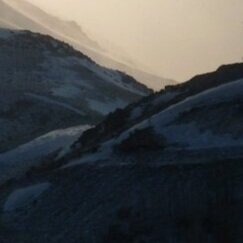Marius van Hoogstraten is a Mennonite academic and preacher in Amsterdam and Frankfurt
Inventive poetics on the fault lines of philosophy, theology, and the world
I work as a postdoc at the Mennonite Seminary (Vrije Universiteit Amsterdam), connected to the Visiting Chair for Inventive Theology held by prof. Chris Doude van Troostwijk.
In my current research, Restaging the Ecclesiopolitical, I analyze the 1527 Schleitheim Confession as listing quasi-biopolitical techniques that work to constitute and regulate, but also displace, ecclesial community. In these readings, a constitutive ambiguity appears to insist itself into efforts to ground a separated identity. I suspect this ambiguity may, in spite of itself, be a site for strategic coinventivity, that is to say, an Anabaptism more beholden to the wider togetherness of a divine complicatio than a stark confessional particularity.
In my dissertation, Theopoetics and Religious Difference, I looked towards the work of Richard Kearney, John D. Caputo, and Catherine Keller as possible resources for embracing the “unruliness” of religious difference. It has been published with Mohr Siebeck (2020).
See a full list of my publications in my CV or on my Academia.edu page.
A Kingdom of dinner parties and buried treasure
I serve as a preacher in Mennonite congregation of Frankfurt am Main. Come by some time — we could get lunch afterwards, if you’d like to talk. Mennonites are a small, global, and decentralized denomination with roots in the radical reformation of the sixteenth century. In its own way, our congregation is a progressive and welcoming community.
But being Church together is more than Sunday service, and the Kingdom of God is stranger and more wonderful than we could ever fit into a liturgy. I’ve found that God will meet us in the deeply familiar, the traditions and places where we are most at home — but will also seek us out especially where we are strange, and will call for us in the unusual and unexpected. I find my pastoral work most meaningful when those two connect, those liminal moments in our lives where the new reaches into the old, where the divine embraces the earthy and creaturely, and we are transformed.
These liminal moments can especially include both the celebration of love and the mourning of loss. If you are looking for someone to walk with you in such times, do send me an email to discuss what role I can play.
Photos (from top): moin.photo; David Bertsche; Paul Gauguin: Vision after the Sermon (1888; Scottish National Gallery)



